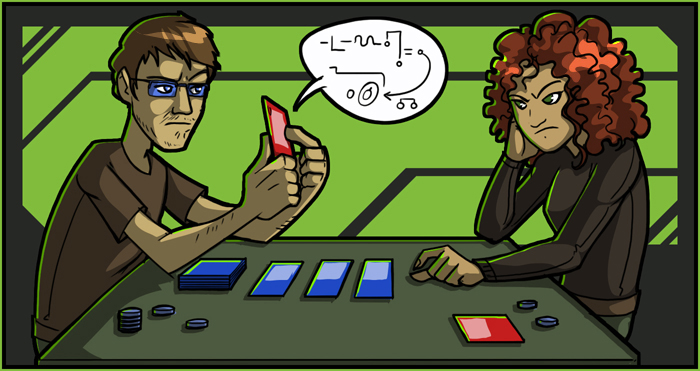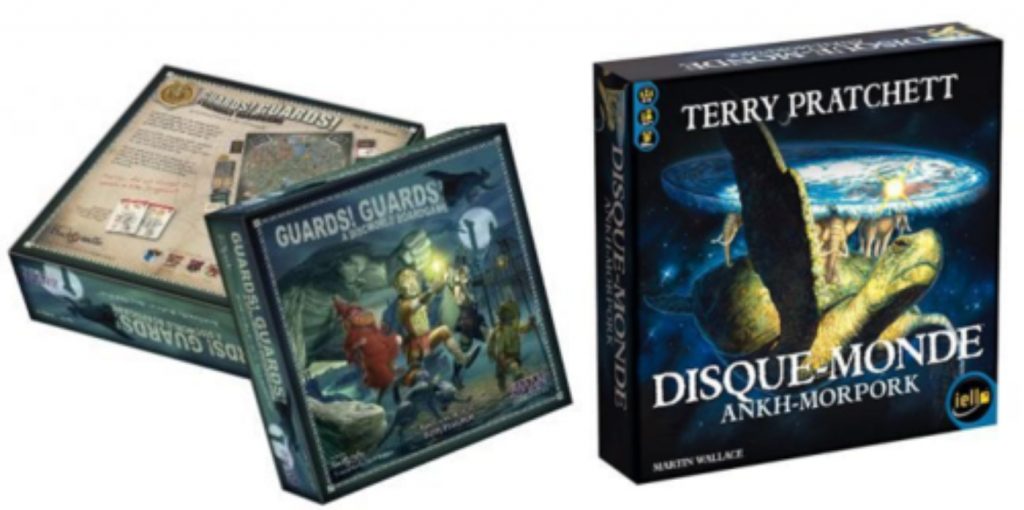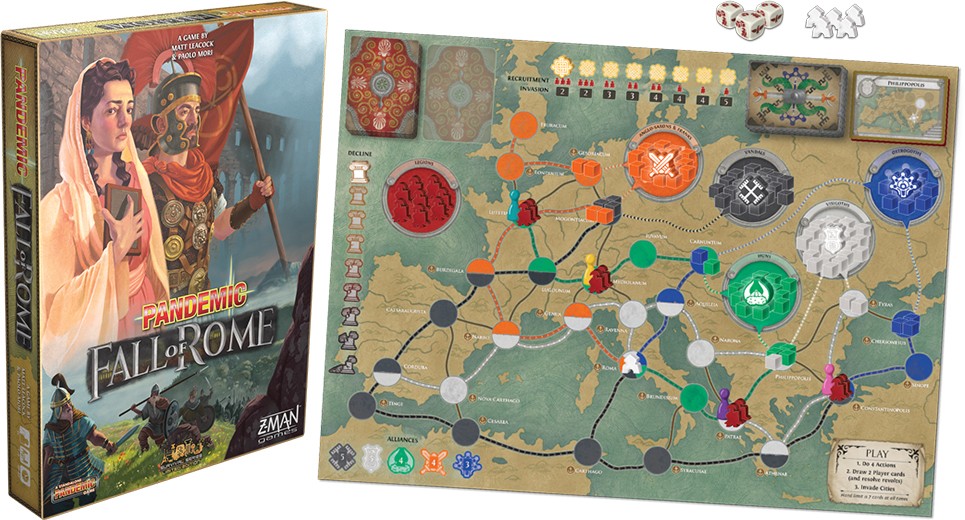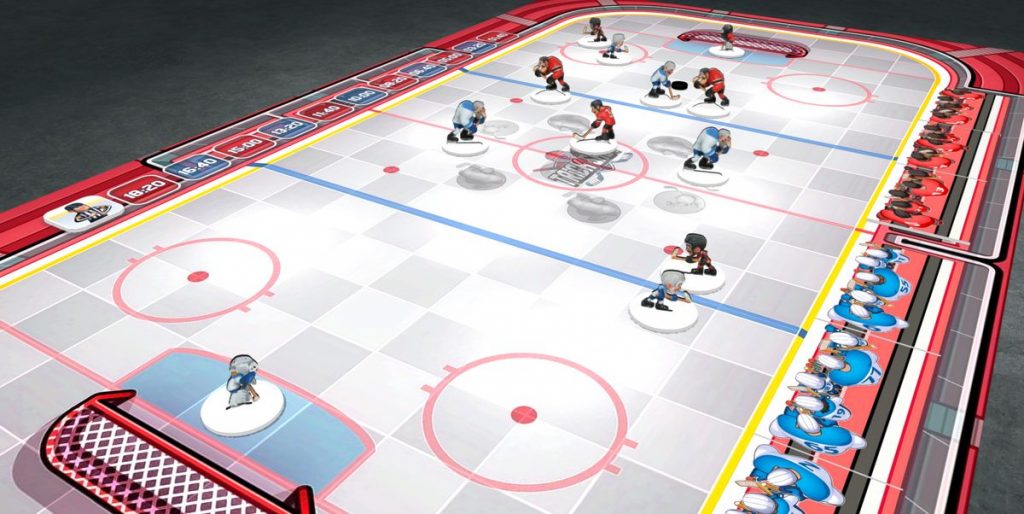Paul: Matt it’s nearly Friday, how are we only now poking our way into the top 40? Why did we take on this challenge?
Matt: Trains.
Quinns: He’s a goner, Paul. There’s nothing we can do for him now. PRESS FORWARD.
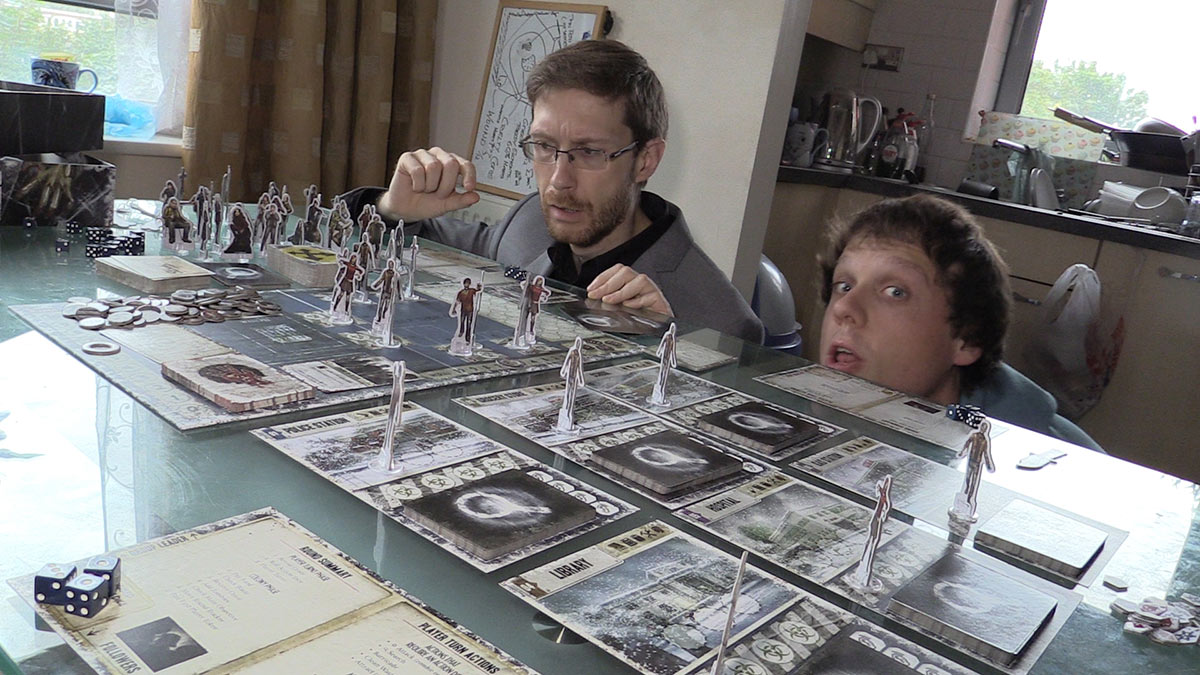
#40: DEAD OF WINTER: A CROSSROADS GAME ![]()
Review here
Paul: I wish Dead of Winter’s narrative events came up more often. I really enjoy this game’s mixing of desperation with distrust, that constant and off-balance momentum it gives you by making sure you always struggle for the equipment and resources you need, but I need those stories to come up just a little bit more. You know why? Because they’ve since added even more to this fine game, and I want to see them all. Basically, I’m greedy.
Matt: Don’t eat too much narrative Paul, you’ll spoil your denouement!
Paul: Why did we hire you? I wanted to hire that pile of sliced limes.
Matt: Gosh I love loads about this game, but my TOP LOVE still has to be the fuzzy nature of being a traitor. Everyone having an objective card that makes them act strangely is a great idea, but the real stroke of genius here is how vague the on-card descriptions are: There’s plenty of room here for the imagination to fill in the gaps, and imagination is the darkest grout. After thrilling at the shock value of the instakill dice, though – part of me wonders if this mechanic could have been handled better? I suspect that really I’d just love to see these ideas and this design framed around something less trite, and perhaps even less… deadly? What happened to the other Crossroads games, eh?
What we said:
Quinns: So we meant to do a review, and I think basically what happened is we talked excitedly for the whole video.
Paul: Well, you know what that means. Shut Up & Sit Down unconditionally recommends Dead of Winter!
Quinns: We’ve got a great storytelling game, and a great co-op game, it obviously looks gorgeous and the writing is great throughout.
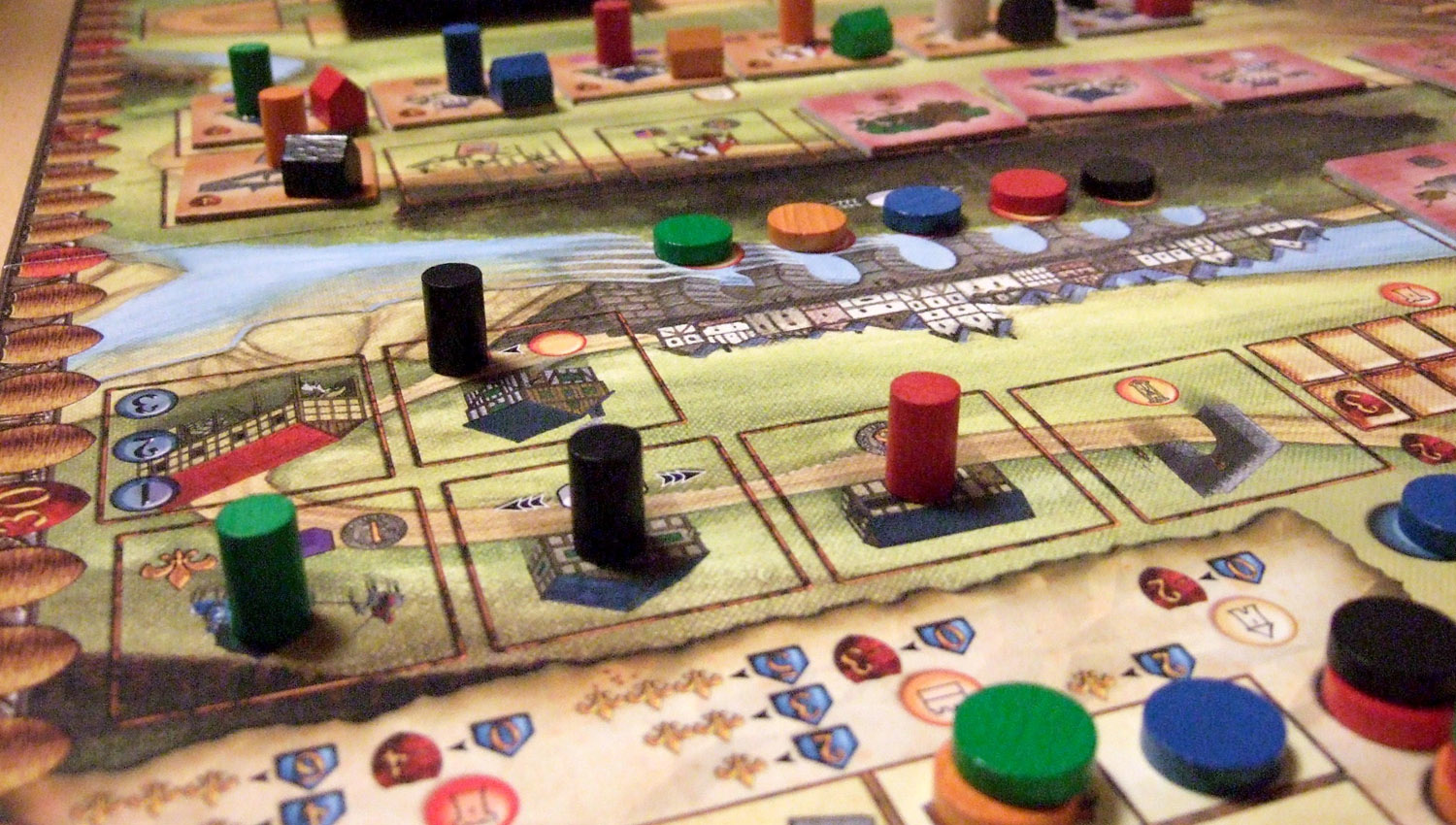
#39: CAYLUS
Quinns: We haven’t reviewed this one either. Maybe… maybe if I don’t write much then people will scroll past this tiny entry
Matt: Quick look what’s that down the page, I think it might have been a train.
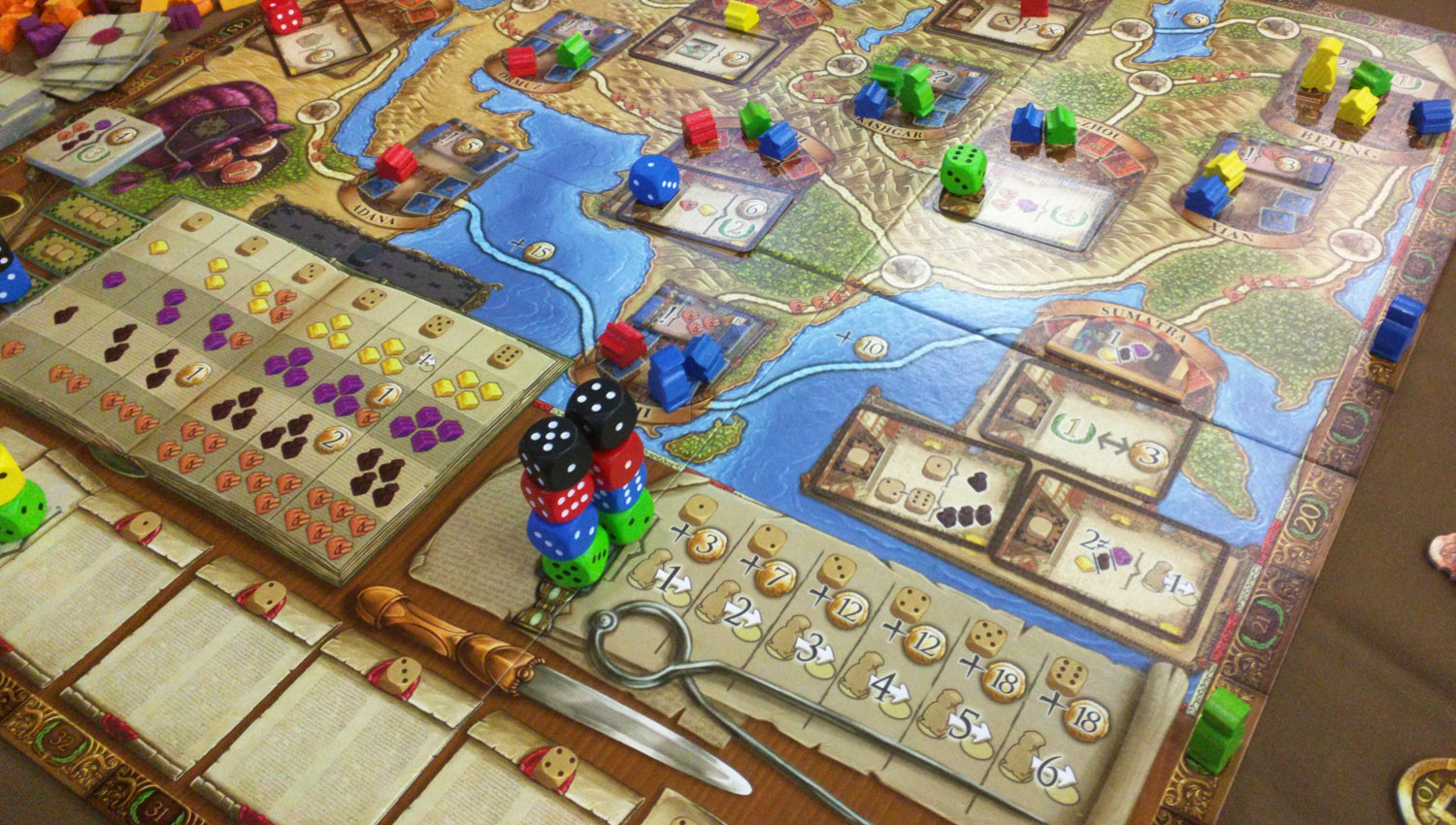
#38: THE VOYAGES OF MARCO POLO
Paul: Oh no. What is this? Okay, I’m throwing my hands up in the air and admitting it right here, right now: We’re into the top forty board games ever and I’ve never heard of this. It’s The One That Got Away.
Quinns: Don’t worry buddy! There’s a very good reason for your withering ignorance, which is that 2015’s The Voyages of Marco Polo has been out of print almost since its release. On the one hand, that means that this game would be even higher up the BGG rankings if more people could buy it, play it and rate it. On the other hand, the fact that you can’t buy it will have driven up its value among the people who do own it, leading to a slightly higher rank.
Matt: Gosh on a hoverboard, this stuff seems complex! It reminds me of the time I literally lost everything after investing quite heavily in industrial tuna.
Quinns: The NA in NASDAQ doesn’t stand for nautical, Matt. There’s really no need to keep buying stocks in fish. But whatever this game’s rank two years from now, it’s probably very good. We’ll be producing an official SU&SD review as soon as it’s back in stock.
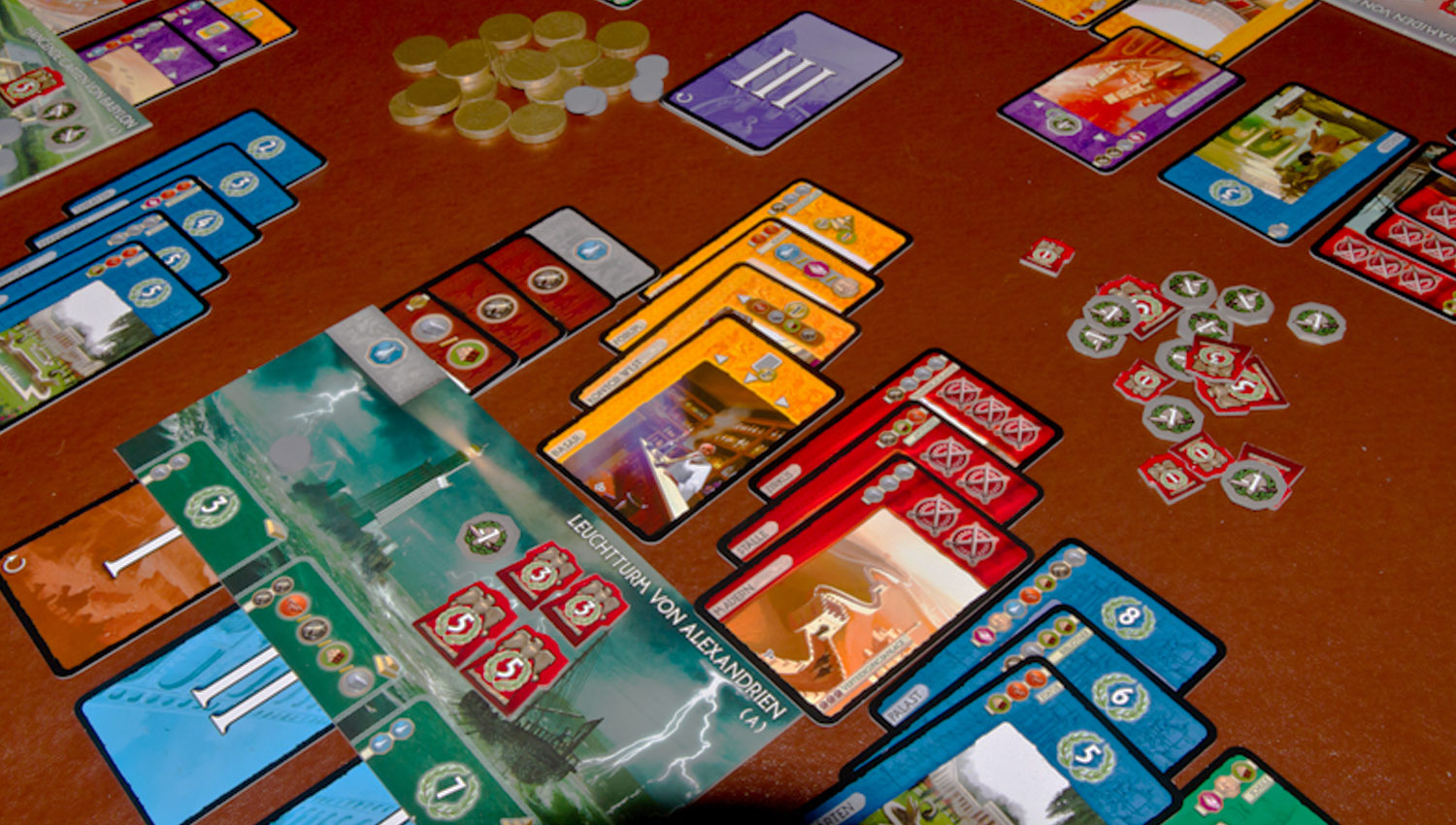
#37: 7 WONDERS
Review here
Paul: Hmm.
Quinns: HMM.
Paul: Am I right that we all love this less than we used to? That’s not to say I’d turn my nose up at playing a game right now and I still like this game’s set collection and beautiful colours, but…
Quinns: It’s a weird one, isn’t it? There are old games that we still love (like Pandemic and Carcassonne), and there are older games where we can explain why they began to frustrate us (like Battlestar Galactica and The Resistance), but 7 Wonders just… gradually faded into ambivalence, like Doc’s tombstone in Back to the Future 3. These days, if people wanted me to recommend a drafting game I’d name Sushi Go Party!. It lacks the full tactical crunch of 7 Wonders (especially if you’re playing with any of 7 Wonders’ expansions), but it’s funnier, faster and so much simpler.
And there you have it, ladies and gents. SU&SD officially recommends eel nigiri over Julius Caesar, and wasabi over wood.
What we said:
Paul: Just because Seven Wonders is easy to grasp doesn’t mean it’s easy to succeed at. Because each time the hands are passed they’re one card smaller, the choices on offer are that much narrower, like a noose tightening around the neck of your wonderful plan.
Yet no matter what nonsense you’re handed, because there are so many cards in this game, all with absolutely beautiful artwork, seeing what’s handed to you is like being given a little gift every turn. A slightly poisonous gift that’ll see you scratching your head as you try to combine these cards with what you already have and what you anticipate you’ll need while also worrying about what your neighbour might need.
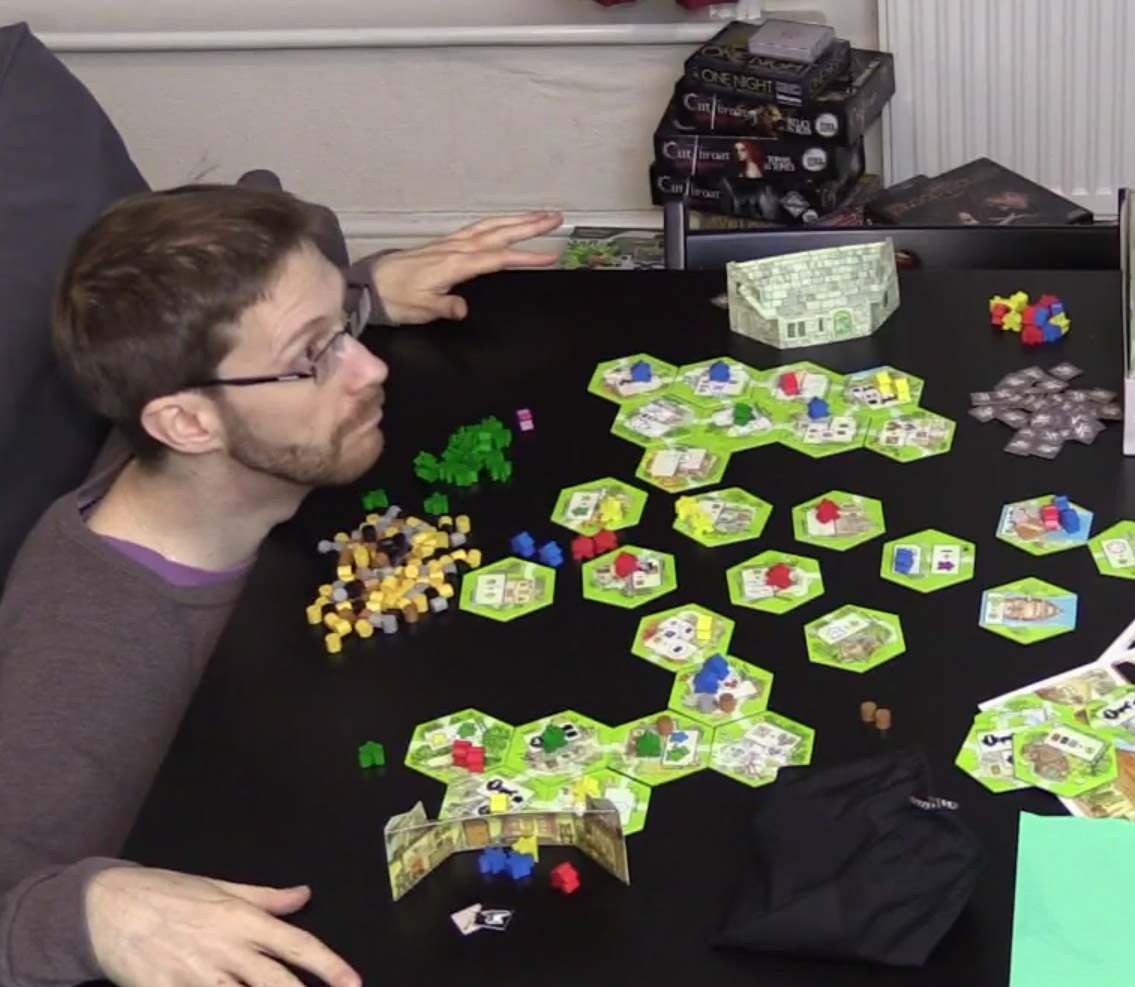
#36: KEYFLOWER ![]()
Review here
Paul: Meeples and hexes and resources and modular play areas! My only three weaknesses! Along with chocolate and bears and mountains and good weather and the Queen and-
Matt: PAUL CONTROL YOURSELF.
Quinns: Holy shit! I remember this game. This is a really good game. In terms of pastoral worker placement I’d probably play this before I play Village (rank #100), so that’s a victory for BGG’s rating system at least.
What we said:
Paul: If we were to try and sell you on Keyflower, it’d be by telling you not to be taken in by the cheery theme. The truth is that this is one of the bloodiest, most mean-spirited battles we’ve played in a while.
A lot of these worker placement games, games where you plonk a person to claim a resource, are asking whether you want something or whether you want to screw over an opponent. Keyflower’s so flexible, with its auctions that let you get workers back and its lack of borders, that playing well is a case of using what your opponents want before they know they want it. Of driving up bidding, and yet never losing sight of your own master plan.
Quinns: Yeah. Worker placement games often see players blocking one another. Keyflower, though, feels like judo. Blocks and momentum and horrific sucker punches that leave players gasping for air.

#35: CONCORDIA ![]()
Review here
Matt: I barely even remember this but I think when I played it I won. That’s life, baby. Probably don’t put this bit in the article.
Quinns: Argh! It looks like we played that game outside of the period that I was using the BG Stats app, so I can’t go back and check, but I’m honestly pretty sure you lost and that was pretty representative of how you are bad at games.
Matt: OH HOW VERY CONVENIENT. I guess I’ll just have to wipe this conversation from my memory, just like I erased the existence of this game. If you need me I’ll be in my trailer, pondering the meaning of trains.
What we said:
Quinns: Concordia’s a a glass of red wine on the veranda. Perfectly pleasant, but a deliciously delicate procedure. Every card you can play will get you what you want… but each card can be used, or it can really be *used*. Take the humble architect. It lets you move, then build, but there’s no limit to how much you can build. So if you have the resources, you could drop three trading posts instead of one. The praetor lets you claim whatever resources you want, but the trick is in figuring our what resources you need. The merchant lets you buy one type of good and sell another type of good, but with timing and forethought you can sell five of the first thing and buy six of the second.
All of which means Concordia is the definition of easy to learn, hard to master. Or, for fans of alliteration, it’s a pleasure to play, but impossible to play perfectly.
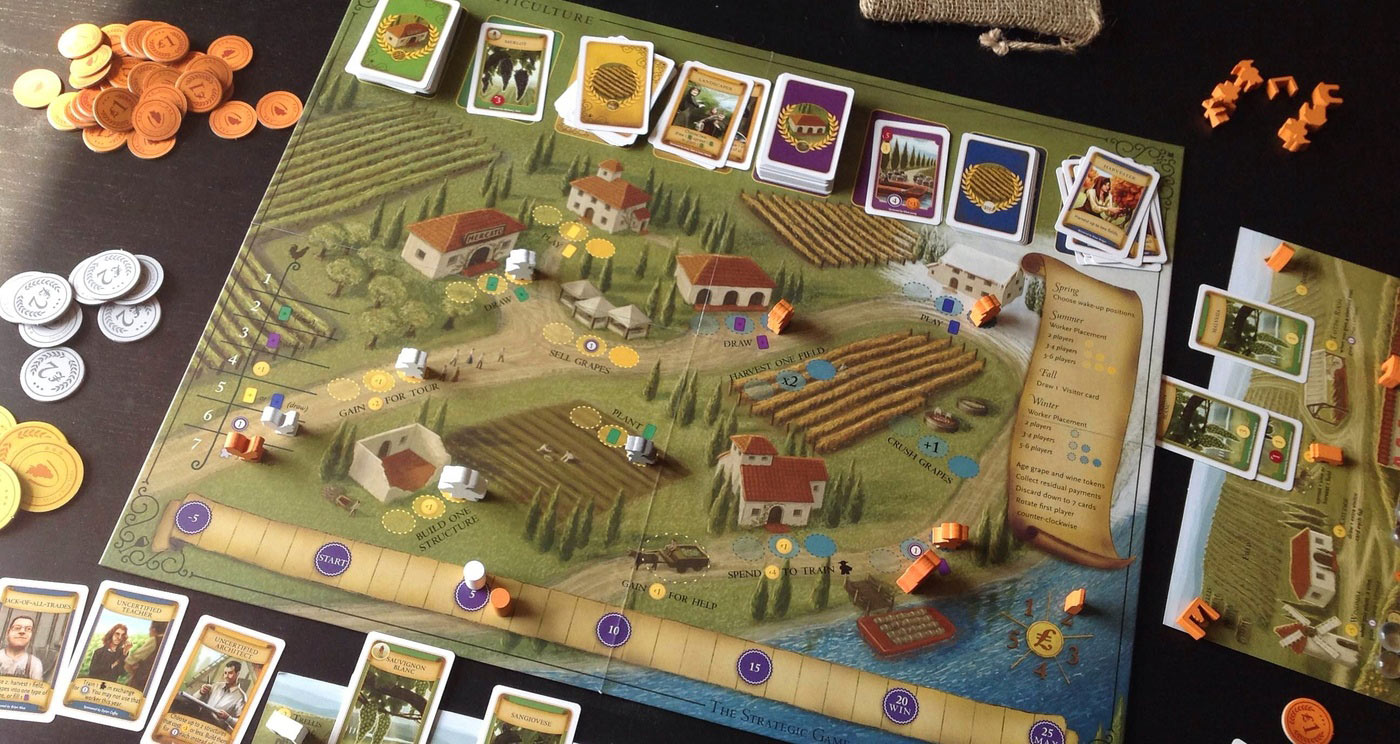
#34: VITICULTURE ESSENTIAL EDITION
Review of the original game here
Quinns: *phone rings*
“Hello?”
“Quinns, is that you? It’s Viticulture.”
“Oh my god, Viticulture! Yeah, this is Quinns. How’ve you been?”
“I’m good! Listen, Quinns… I have a new Essential Edition now. I’m actually BGG’s 34th best board game of all time. I was wondering if you wanted to review me again.”
“Oh wow, that’s great! I’m so happy for you. But… listen, it’s complicated. Brand new board games come out every week, and there are hundreds more we never got around to reviewing when they first came out. It’s just so hard for us to justify going back to re-review something. It’s nothing personal. Oh, hey! Won’t you get a 2nd edition at some point? Maybe I could just play that? How about you call me if you get a 2nd edition?”
“Boy, you haven’t changed at all.”
“I’m sorry?”
“You think you’re so smart. You invite us over, critique us, make games like me feel wanted for just a handful of wild nights, and then that’s it. It’s over. You never call back, you never check in to see how we’re doing. If we don’t make it onto your ‘Special Shelf’, you’re done with us.”
“Right. (Don’t worry, I’ll be done in a minute.)”
“Oh my god! Are you with a new board game right now?! I don’t believe this!”
“Listen, Viticulture, this isn’t a great time. Can you call me back in like, a few years, or something?”
“You’re a SCUMBAG, QUIN–”
*dialtone*
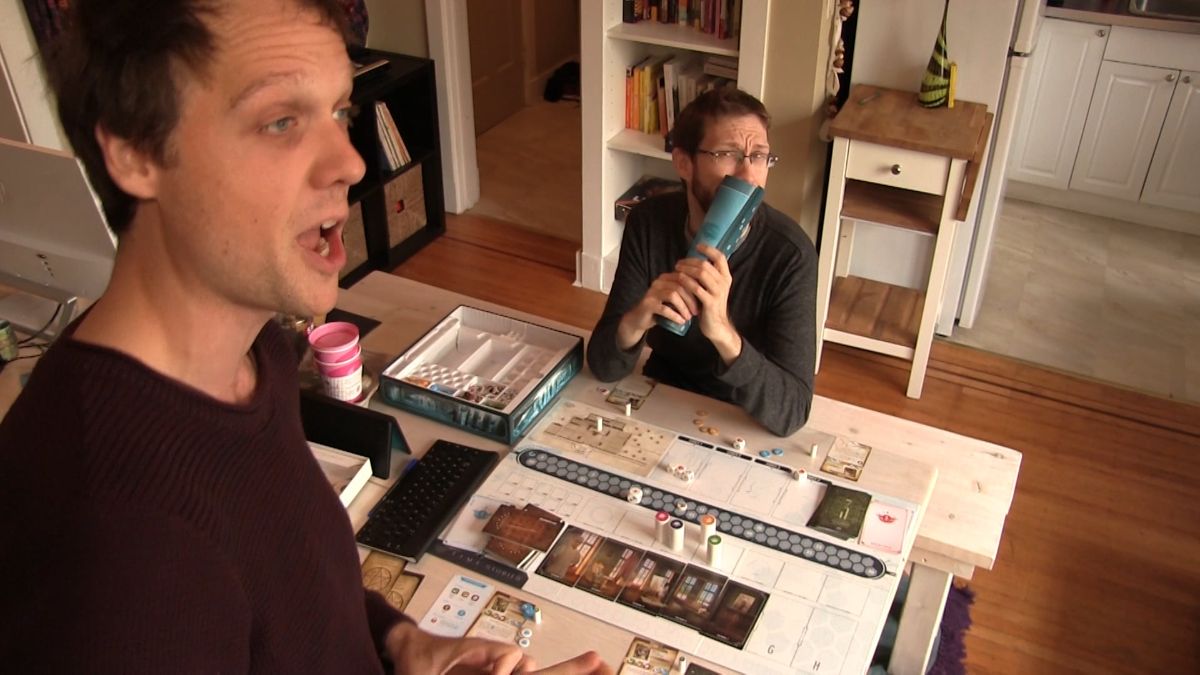
#33: T.I.M.E STORIES
Review here
Paul: Oh my God I’m so angry about this.
Matt: Please Paul calm down, look at this relaxing postcard of a train.
Paul: I’m just angry. I can’t form words. When I try to speak, there’s a noise like a bucket of geese falling down a stairwell. Even when I type I want to headbutt the keyboard.
Matt: Please Paul put the bucket down, these poor gooseboys have done you no wrong. Seriously though, I’ve only heard good things about the A Prophecy of Dragons adventure? Such an odd thing though, where the expansion might improve the game by literally being a different game.
What we said:
Paul: Time Stories is one of those games that gets me worked up because of its potential. The art, the inlay, the idea, it’s all there, and I’d LOVE to collect a whole shelf of these beautiful scenario boxes, but playing them is half genius and half watching a drunk man trying to set up an Apple TV.
Quinns: The idea of spamming your players with information that they have to remember, then asking them to remember it on later playthroughs with no notes? Brilliant. But in execution, you’re going to remember almost everything without much effort. Setting up a mystery that has players questioning why they got sent back, Quantum Leap style? Perfect. Ultimately never explaining that mystery? Awful! Using dice so that players encounter unexpected setbacks, forcing them to take diversions on their runthrough? Brilliant. Having it so it only ever slows you down? Idiocy!
The prospect of travelling to any number of obscure pockets of human history? Fantastic! Time Stories immediately dumping you in the two most over-used genres in all of board gaming?! Terrible.
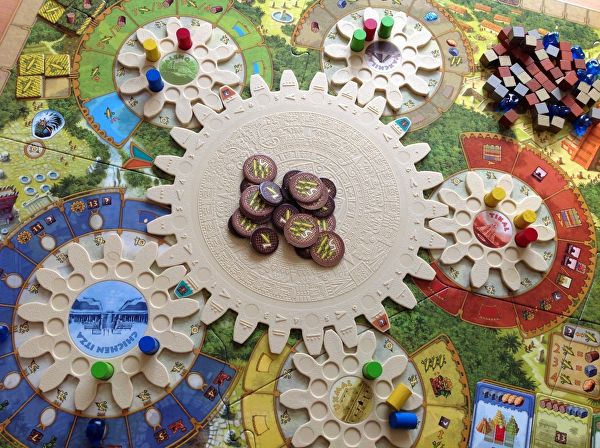
#32: TZOLK’IN: THE MAYAN CALENDAR ![]()
Review here
Matt: Quinns talks about Tzolk’in all the time, if he loves it so much why doesn’t he just marry it.
Quinns: Are you kidding? Trying to kiss all of those spinning cogs just makes you feel dizzy and sick.
Matt: Don’t you mean, “It would probably make you feel dizzy and sick?”
Quinns: That’s what I said
Matt: What?
Quinns: What?
What we said:
Quinns: Simply put, Tzolk’in represents a pinnacle of puzzling, of design, of a board game’s joy as a physical object, and of this brand new genre of worker placement that we’re still plumbing the depths of.
It’s not just that it’s a hypnotic challenge. It’s also about how your friends’ play will see various options closing and opening to you, making it different every time you play. And this is on top of the multiple paths to victory in Tzolk’in’s rules – your tribe might pursue buildings, religious favour or the glossy immediacy of the crystal skulls dial. You might play with a taxing crowd of workers or none at all. You could advance your tech or ignore it. You could push blindly for your own wealth or detect your competitors’ and try and shut them down.
It might not be for you. It’s certainly not for players with no interest in locking their minds into a an exhausting two-hour bout with more numbers and possibilities than your average supermarket shop. But if it is for you, you probably need it. This big, beautiful box is bending over backwards to please you. All you have to do is let it.
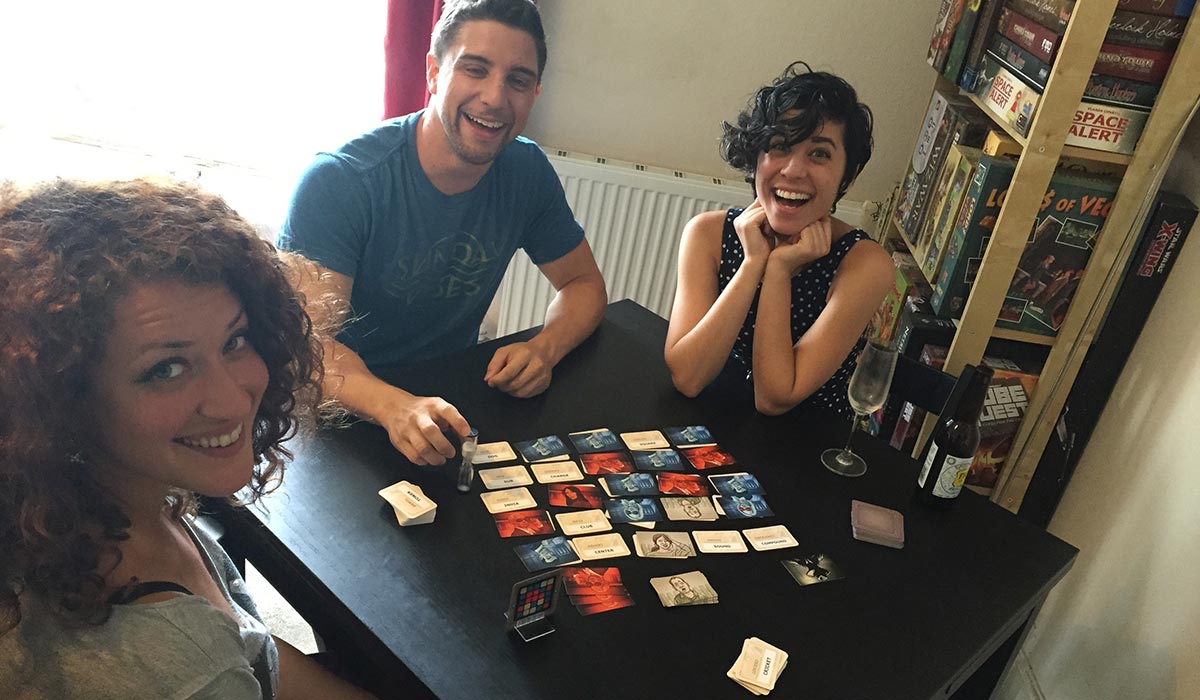
#31: CODENAMES ![]()
Review here
Paul: Codenames used to hold such a thrill for me and there’s just a shaving of that thrill, just a sliver or the lightest of scrapings, that has been lost through all the games I’ve played. It’s a wonderful concept and produces an excellent mix of confusion and consternation and everything else.
Matt: It’s remarkably strong, and I’m comfortable with it sitting so high in this list. I must say though I’ve not been sold at all on the glut of alternative versions of this released – replacing words with pictures is like removing half the limbs of the game’s design, and the thematic versions are really no better: why take a game about communication and the glorious breadth of interpretation and start erecting fences that direct or control that? Vanilla Codenames for life – this tiny hill I will happily die on.
Quinns: I am picturing you slumped over something about the size of a speedbump.
Pip: I GOT HERE AS SOON AS I COULD BUT THERE WAS A SHORTAGE OF TRAINS. Speedbump 3, you say? I’m going to guess… Kangaroo? Wave? And… Canada? You have speedbumps near you right, Paul? Oh wait, that’s a sleepy bear. Never mind.
What we said:
Quinns: Codenames is a team-based party game for 4 to 8 players. I’ve played it with 15 different people, and all 15 of them have come away wanting to buy it. Including me. In other words, Shut Up & Sit Down Recommends Codenames.
Codenames is a deep game with simple rules, it’s tense and silly at the same time, and it’s fun when you’re winning and even better when you’re losing.
Maybe now you see what the fuss is about, eh?
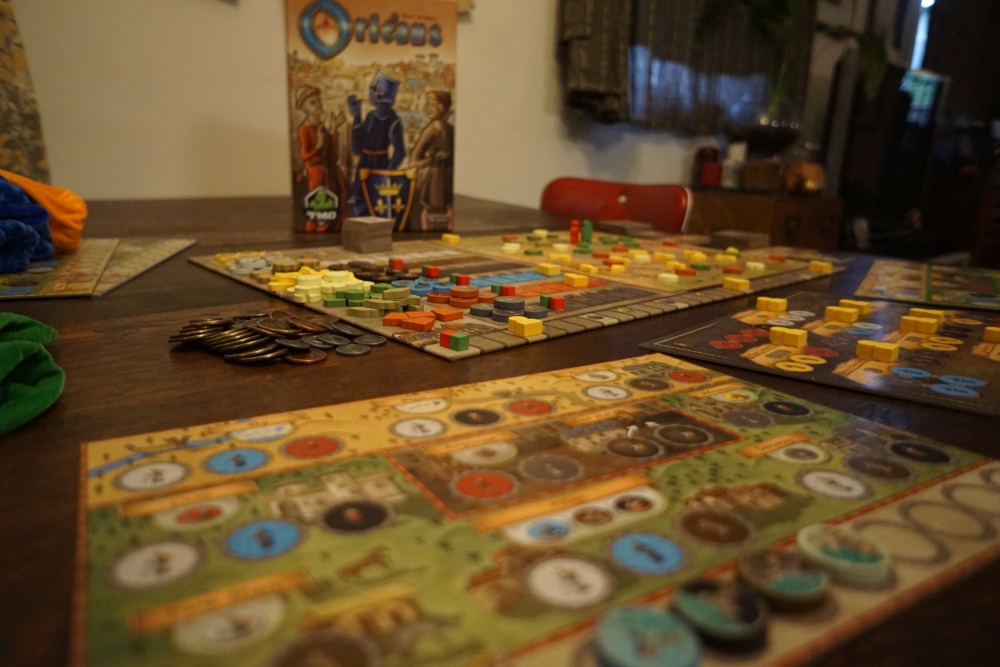
#30: ORLÉANS
Review here
Quinns: I own this now! Last time we talked about Orléans we said it was a shame that no-one on the core editorial team had played it, but I’m now two steps closer to playing it because I own a copy and I’ve read the rules. What I’m saying is that if there were some kind of Orléans-related emergency and the prime minister of the United Kingdom was looking for someone to play this game, I could (hypothetically) do my duty for queen and country (depending on if I was busy or not).
What we said:
Bolds: The experience of play is satisfying, even if the end can let you down or the scoring boggle your brains. I think Orléans is a great design because it’s strategic and tactile, and it has those surprising ups and downs. Those who enjoy heavy games may find it a light, fun diversion, and it’ll make a lovely, complex game for those who prefer a lighter experience. For a one or two hour playtime it delivers the kind of experience you get with much longer games, and the simultaneous play means you can actually jest, jeer and jape at your fellow players while you do.
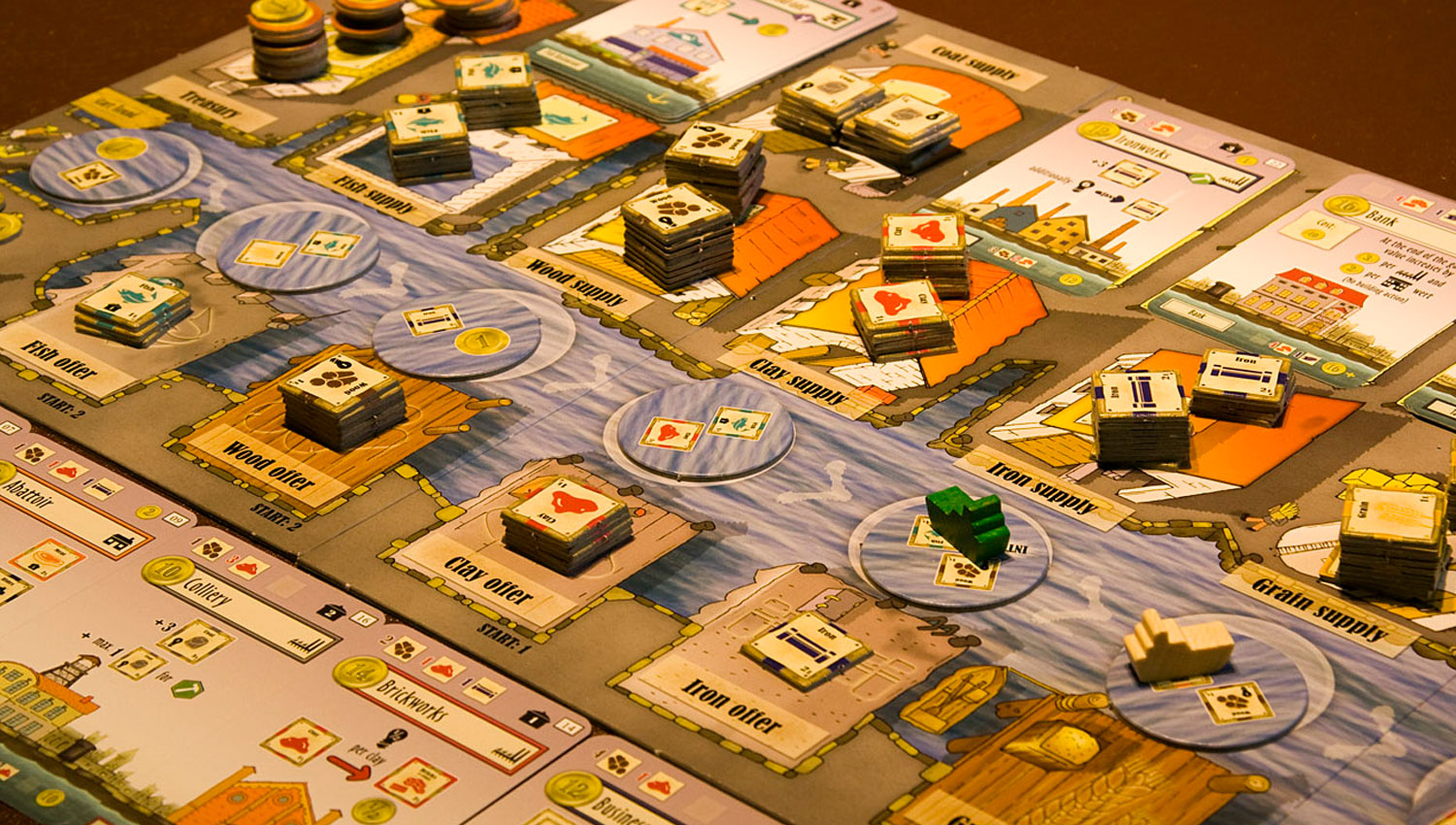
#29: LE HAVRE
Matt: I liked their first album but I haven’t kept up with them.
Quinns: It’s another Uwe Rosenberg game! Paul, at some point you became our Uwe expert, or “Uwespurt”, and therefore it falls to you to explain why we haven’t reviewed the 29th best board game ever made (according to the people who feel a desire to log in to a byzantine site and rate the games they play).
Paul: I guess I could buy the one copy that’s on Amazon.ca right now for $319?
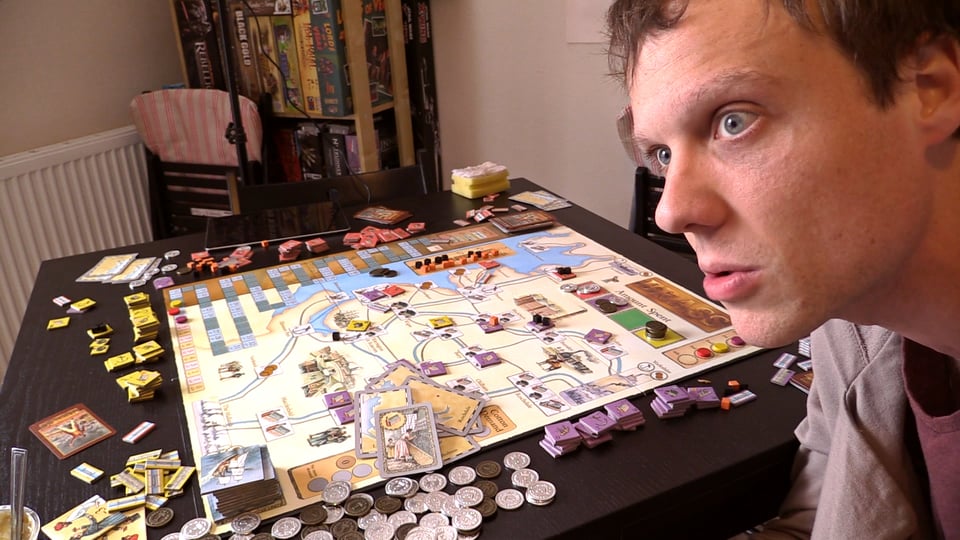
#28: BRASS: LANCASHIRE
Review here
Quinns: I smile when I think of our Brass review, just for all of the shots where I dropped food on the board. For some reason the combination of this ponderous board game and sticky cake really makes me laugh.
SU&SD fans will remember that while I didn’t recommend Brass, I couldn’t help but admit it had some magic to it, and as such I’m really looking forward to Brass: Birmingham. The art design of that upcoming Roxley edition is absolutely breathtaking, and if they’ve managed to substantially smooth out the game itself… well, let’s just say that Brass might yet earn it’s SU&SD Recommends badge.
What we said:
Quinns: Brass is well designed, and I do appreciate it, but I do so in the way that I appreciate an old car. I can enjoy the curvature and historical innovation without wanting to actually take it for a ride because it’s going to be bumpy and slow. Which is kind of ridiculous, because Brass only came out ten years ago.
In Board Game Geek’s top 100 you find these little tough nuggets like Dominant Species or Twilight Struggle that have been put there by the diehards who kept board games alive throughout the 80s and 90s and early 00s, and to whom Brass is as rich and addictive as tobacco. And if they’re having fun with it, awesome. That’s fantastic. But now, with more games and types of games and more people and types of people playing games than ever before? When the competition is astronomical? Brass is a shade too awkward. It’s tiring to learn, tiring to teach, tiring to finish, and very intense in between.
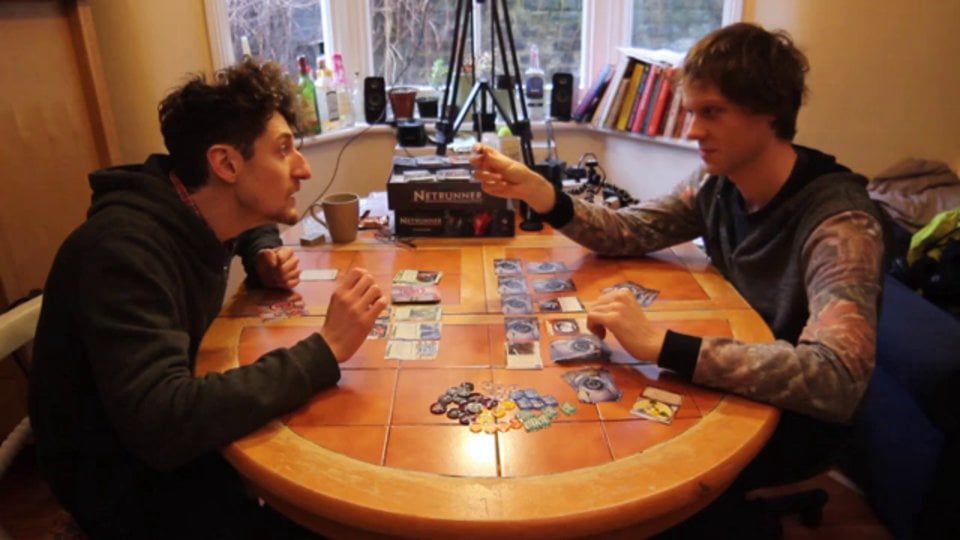
#27: ANDROID: NETRUNNER ![]()
Reviews here and here, our playthrough here, and don’t miss this feature, or this one! … I guess we like this game?
Quinns: Oh jesus! This is a weird game to be confronted with, and not just because I don’t play it anymore. It’s weird because with every month that passes Fantasy Flight releases another Netrunner expansion, making the competitive metagame of Netrunner slightly more wobbly. Talking to my friends in the tournament scene confirms that this game is no longer the lithe creature it once was, and (together with the X-Wing Miniatures Game) it’s entered into the years of middle age where a collectible game becomes flabbier, weirder and an order of magnitude more expensive if you want to take it seriously. Soon will come old age, followed by the glorious resurrection of the reboot.
…None of which matters if you just wanna get a core set of Netrunner and simply mess around with a few friends, of course. This is still an outrageously cool idea for a card game that stole whole years of my life, and if you’re not careful it could steal some of your years, too.
Paul: I just want to say three quick things which are 1) I don’t care for deckbuilding much, 2) This isn’t really my jam 3) Nevertheless, every time I play it I like it and think its mechanics are marvelous.
Pip: I refuse to graduate from the vanilla version. BUT I do want to take this opportunity to say you should learn it by reading the rules and figuring it out rather than, e.g. going over to a friend’s house because they promised to cook you a Burns Night dinner and didn’t even mention that it was a card game trap and THEN having them explain it while cooking haggis and drinking whisky but only explaining bits that are relevant to them winning and not you understanding what is going on. Do not do that entirely hypothetical thing.
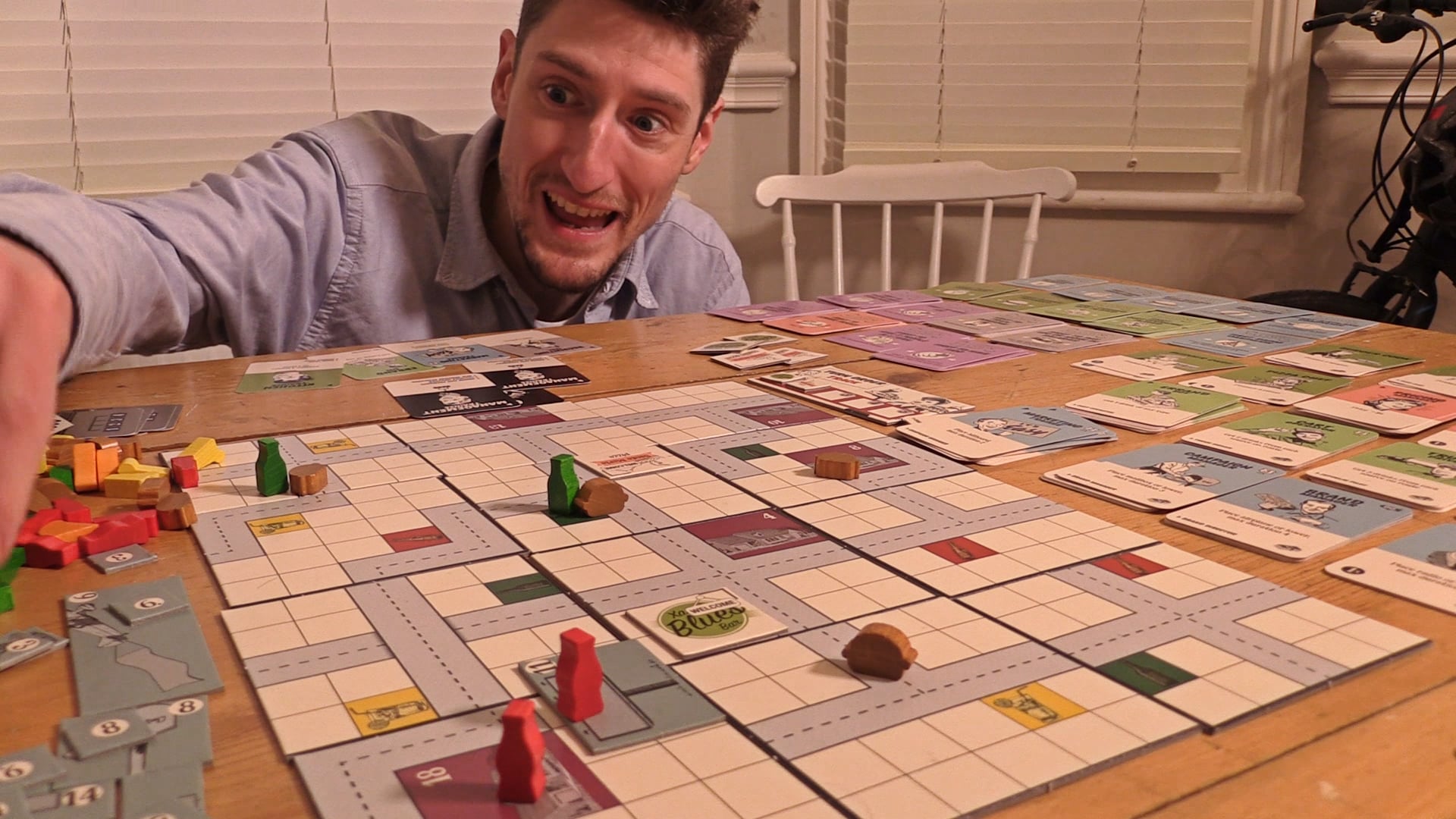
#26: FOOD CHAIN MAGNATE ![]()
Review here
Matt: There are so many things about this game that are just perfect. The harsh unchained backdrop of capitalism frames a game where all of your opponents threaten to rocket ahead in a spectacular fashion. The competition is brutal, it’s a complex machine, I can’t think of any other game of this type that manages to be so cutthroat and brutal. I’m not sure how frequently I’d find something like this making its way onto my table, but I hugely respect what it does and what it is. I mean gosh – it really does look and feel like a prop from Back to the Future: a fabricated snapshot from the past, perhaps used by the Doc to explain a conspiracy within the fast food industry.
Quinns: These days every new game we play feels like the offspring of something we’ve already reviewed. That wasn’t the case with Food Chain Magnate, which blew into my house like a sexy drifter with a head full of beautiful, insane, unrecognisable ideas. This was certainly the most innovative game I played in 2016, and I’m foaming at the mouth to find out what tiny Dutch publisher Splotter Spellen do next.
Pip: I am hungry. Did “having lunch” make it into the BGG top games list?
What we said:
Matt: Oh when you’re making an egg, for your good friend, you gotta make the best egg that you can!
Quinns: FCM has all the joy of the very best engine management games, where you’re having new realisations of how to solve it for the entire game, but it has its cake and eats it, because all the variables you’re working with are what your friends do, which is so much more social, surprising, and fun. You’re not just building a fast food chain, you’re figuring out how to deal with your friend’s bar and marketing machine that’s turning the entire town into alcoholics.
Matt: FCM is a complex machine, but while long-term strategies still remain key – round-by-round play is done by feel, rather than fractions. You can sit and stroke your chin about optimising profits if you want, but FCM is willfully ruthless – you aren’t just dealing with a spanner in the works, you’re dealing with your machine being declared obsolete by a man as he pours buckets upon buckets of spanners down your trousers.
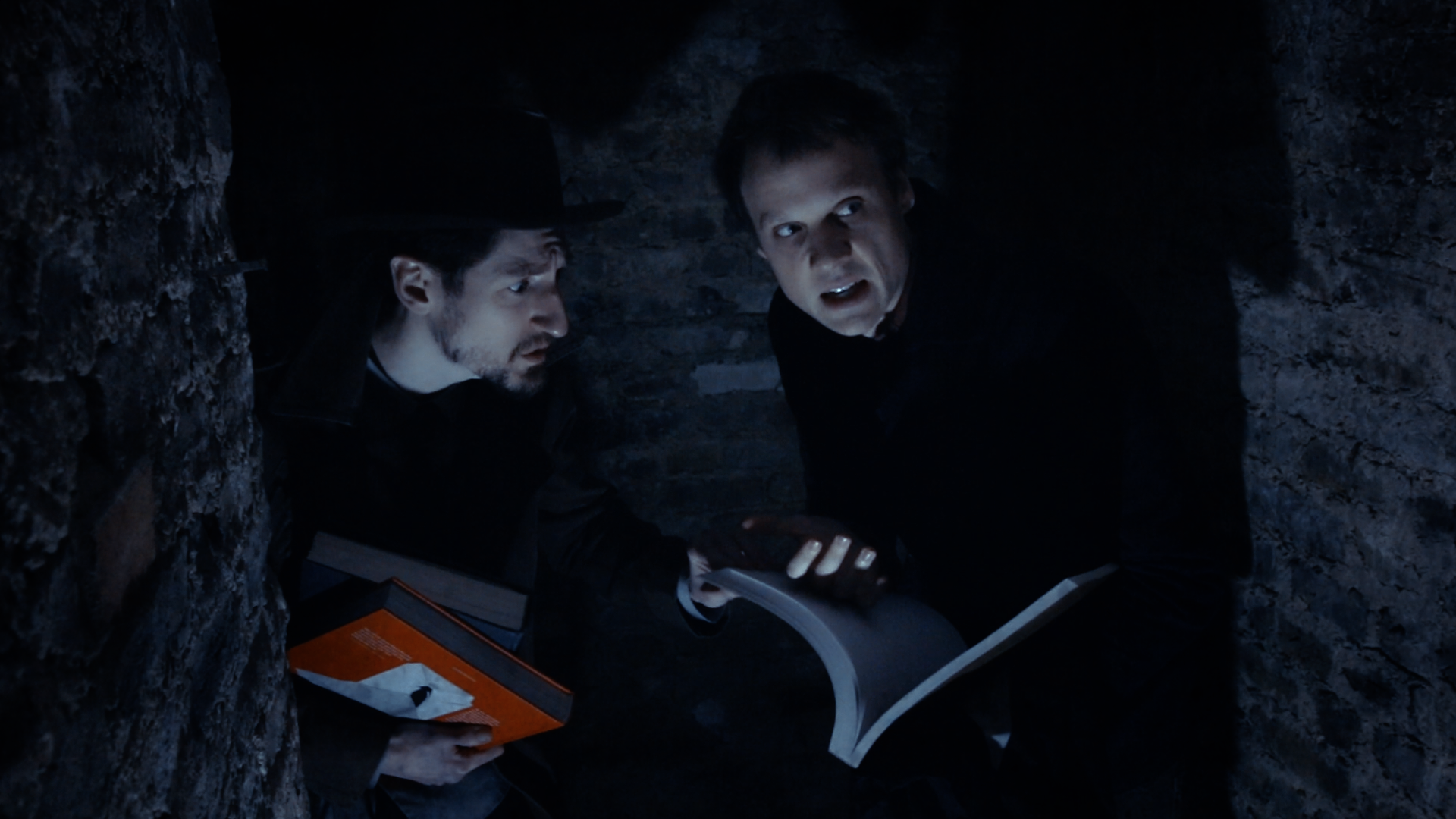
#25: ARKHAM HORROR: THE CARD GAME ![]()
Review here
Matt: God on a motorbike I love this game. My ability to play it has been massively hamstrung by the fact that I told all my friends it was amazing, increasing the size of my regular playground from a svelte 2 to a complicated 4. Still, the last time we played we conjured the collective mental image – and attempted to create the presumed sound effects – of a man vomiting through a trumpet. One of the most evocative things I’ve played in years, even if what’s being evoked is frequently a bit silly.
Quinns: Last time I played this with my team we chatted about just how strange it is that this game is so good. The storytelling is wonky, the challenge can be unfair and we have to reference the manual every time we play to figure out some edge-case rule. And yet despite all of that it’s one of the best games to come out last year. Just what is going on?
Pip: I have played this game for hours and Batman still hasn’t shown up. I think my copy is broken.
What We Said:
Matt: In the past we’ve been frustrated by games like Mice & Mystics and T.I.M.E Stories, where maddened plot beats would undermine the game without warning. By contrast, Arkham’s twists feel like the dips and lurches of a rollercoaster, routinely causing waves of groans that are always accompanied by grins. They simply enhance the game.
Quinns: The game is fun, the deck building is a delight, the scenarios are wonderful, and the game is improbably generous with its content. An evening with this card game is a new adventure, almost like meeting up to watch a cheesy TV show together.
But this generosity is actually the one thing you should take into consideration before you buy it. You can pay £30 for the core set and finish it in a couple of awesome evenings. It’s a celebration of your time together, and great value compared to a night out, but it’s pretty poor value compared to any other board game. If you’re buying one game this month to explore with family or a roommate, this might not be for you.
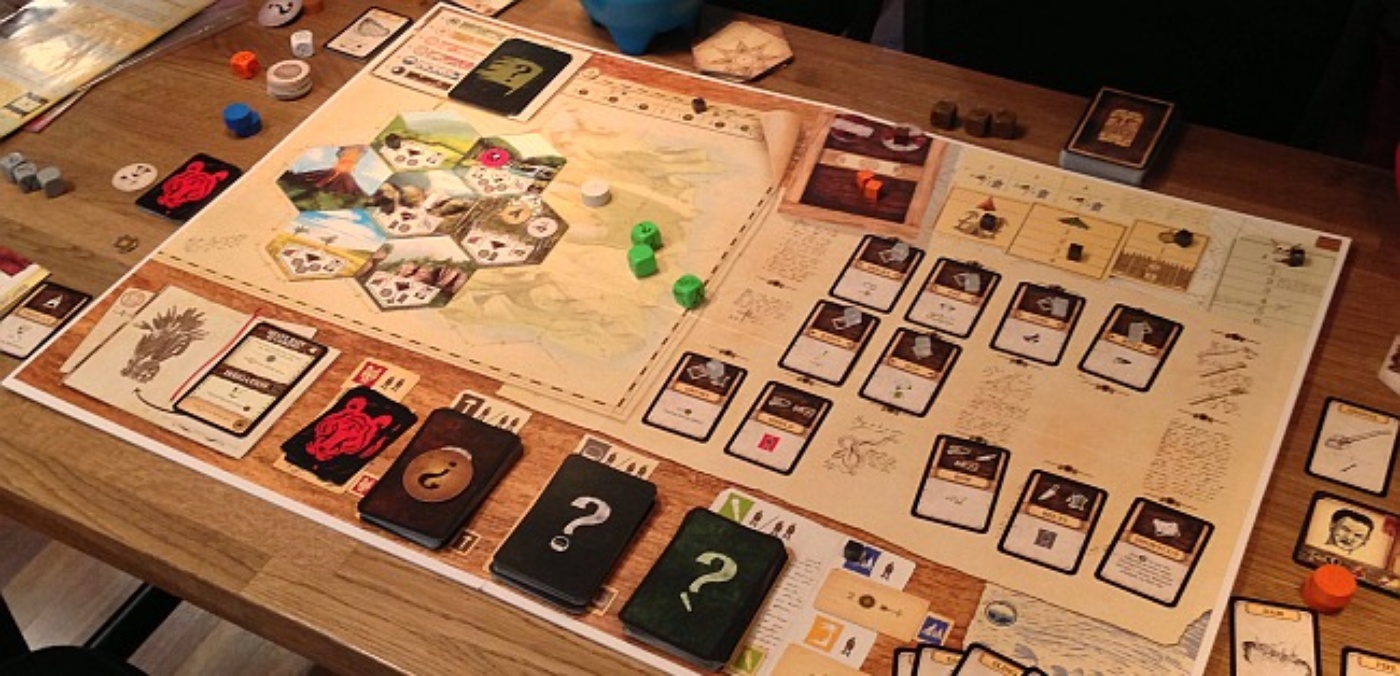
#24: ROBINSON CRUSOE: ADVENTURES ON THE CURSED ISLAND
Review here
Quinns: Oh my god. In my humble opinion, this could be the single most egregiously-placed game on this list. If I think about the fact that it’s placed higher than Pandemic, an actual masterpiece, I feel sweat prickling on my forehead.
I’ll be the first to admit that this game of surviving on a desert island has gorgeous presentation, and it’s evocative without being overly complex. But as a game? It has no means of preventing the most experienced player from telling everybody else what to do, something exacerbated by the fact that success doesn’t come from careful analysis of a problem but by wandering through a minefield of random chance, noting all the many ways in which the game exploded your thought process.
Goodness me. I reviewed this game more than four years ago and apparently I’m STILL angry about it.
What we said:
Quinns: Crusoe isn’t the playground it appears to be when you open the box. Nor is it a fascinating yet accessible puzzle, like Ghost Stories or Pandemic. It doesn’t give players a reason to keep to themselves, like Shadows Over Camelot or Battlestar Galactica, and it doesn’t put players in charge of their own part of the co-op experience, like 1812 or Space Cadets.
In short, we could never recommend Crusoe over a game that… that actually functions as a game. Because what we’ve got here is just a cryptic hive of mechanics.
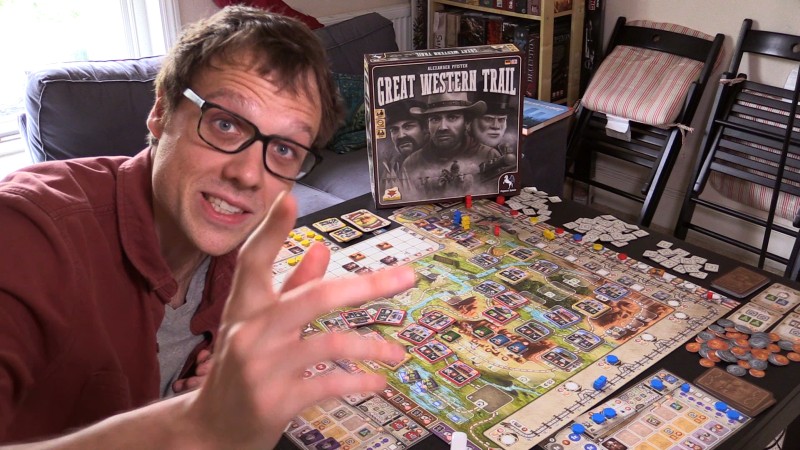
#23: GREAT WESTERN TRAIL ![]()
Review here
Matt: There is no West greater than The Old Big West. Roaming the cow sands with a trusty hat, rustling cattle, friends, and ruddy good times. Hopping on a train to fortune, the wind whipping at the gaps in those brand-new chaps as you gorge yourself on rich beef sausages. I like this game a lot because – whilst it does contain trains – it has the decency to also include cattle, rosettes, and men with hats.
What We Said:
Quinns: What the core systems in Great Western Trail have in common is a frankly implausible balance where no decision is easy, and yet no decision is slow because your options are so tight. Do you move here or here? Do you buy a cowboy or a labourer? Do you gain the option to thin the worst cows from your deck, or move your train? This is a deeply involved management game, with players starting from nothing and constantly getting new stuff which is exciting, but this is a race and so you start cutting corners and so you get drama.
Now, the traditional problem with games like this – where you’re fretting over a complicated little machine – is that often the interaction between players is deeply half-arsed. Great Western Trail has one of the smoothest solutions to that that I’ve ever seen, because you can think and THINK, safe in the knowledge that your friends will never ruin your plans, but everything they do affects you, tweaking the game’s variables or otherwise fiddling with its number-udders.
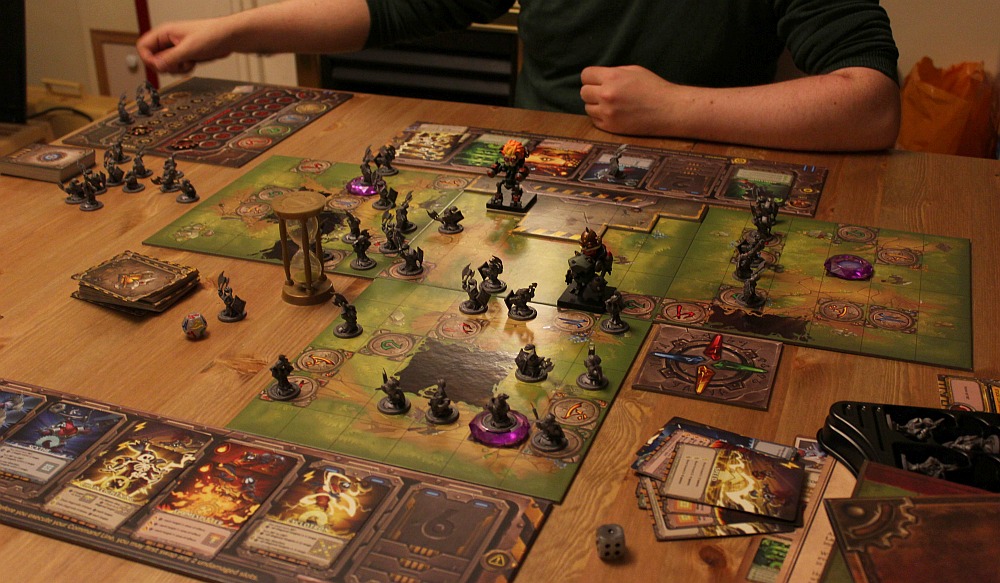
#22: MECHS VS. MINIONS ![]()
Review here
Matt: The structural pacing of this felt a little slow to me, taking a few missions to introduce key rules and ideas and truly flex itself out into full, meaty form. Still – once rolling it’s really rather strong, impossibly luxurious, and very bloody big. It’s lacking the bite of truly bold ideas that would – for me – elevate it to greatness, but as a buffet of game design it’s quite the spread. You’ll need a buffet-sized table to play it on, mind you.
Paul: Holy crap is this a game that really works hard to look good, to introduce new players to board games and to give you an awful lot of bang for your buck. It’s insane how much is in this box. In. Sane. I think all of those things deserve considerable respect.
Pip: I love this game so much! I don’t think the rest of you play League of Legends but for me it’s this awesome marriage of a digital game I spend a LOT of time with and a bouncy, approachable set of systems. It just feels *right* for the world, you know? The only problem is that it’s so big and luxurious and heavy that it has a maximum play radius beyond which I refuse to travel.
What we said:
Pip: Mechs vs Minions is REALLY good! The developers bill it as Robo Rally meets Descent to give you an idea of how it plays. It’s a wonderfully produced game with so much variety across the campaigns. Once you’re comfy with the basics you start playing with different options, trying to combine cards and abilities in new ways. Some elements are affected by dice rolls, but their effects were never strong enough that I felt screwed over and there’s a lively, silliness to the characters and the world which helps slightly out-of-control mechs feel comedic rather than unwieldy. I’ve also been thinking about the replayability and how I’d actually be happy to go back to older missions, especially if we play with different numbers of players (Finishing the campaign also unlocks a “Hard Mode” – Quinns).
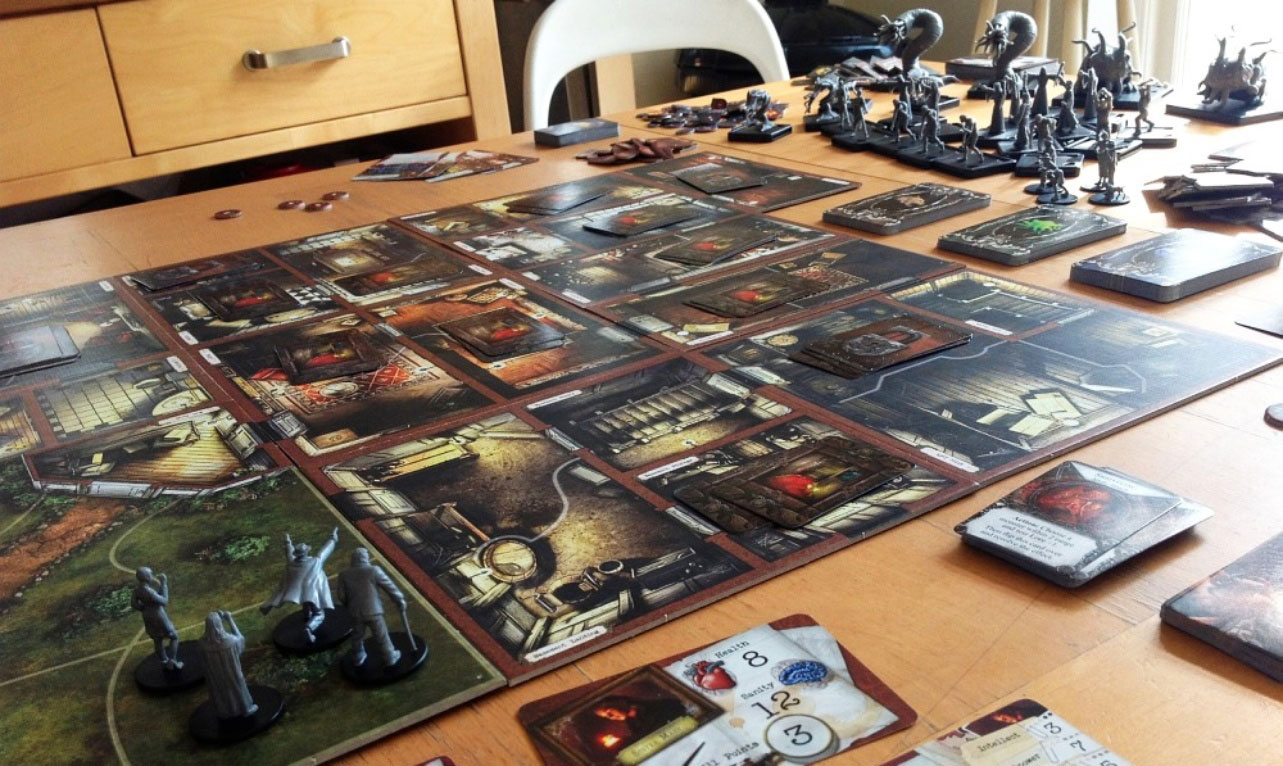
#21: MANSIONS OF MADNESS (SECOND EDITION)
Quinns: That’s not a photo of the second edition! That’s my photo of the very different first edition of Mansions of Madness, before Fantasy Flight replaced the antagonistic “keeper” player with an app. Who’s going to think about the ramifications of automation on the economy, eh? Just imagine. All of those keepers out wandering the street, looking for work, their pockets jangling with plastic horrors.
Paul: Remember that time we stopped playing the second edition because it was just throwing nonsensical random events at us?
Quinns: I remember that game distinctly. You’d come over for my wedding and we had just two days to play games together and write reviews. Our hatred of Mansions of Madness 2nd edition was instant and unanimous. With limited time together, we didn’t want a game to spit weirdo fluff at us. We wanted to play together. So we packed it up and played Inis instead, and my god, that was the right choice.
SU&SD Takes on the BGG Top 100
100 – 8180 – 6160 – 4140 – 2120 – 1110 – 1

